2.3 Meine Wohnungseinrichtung

Lektionsüberblick
For some, a home is a reflection of who they are and for others it is an entirely functional decision. Regardless, it’s important to be able to talk about our living spaces. In the end of this lesson, you will be able to 1) talk about the typical rooms in a house or apartment, 2) talk about the typical features and furniture, and 3) describe your living space.
1) Die Zimmer
Using your experience with German and what you know about cognates (words that look the same in two languages), what German words below do you recognize? See how well you can complete the activity using your existing knowledge.
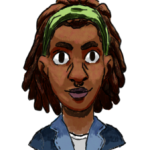 |
|
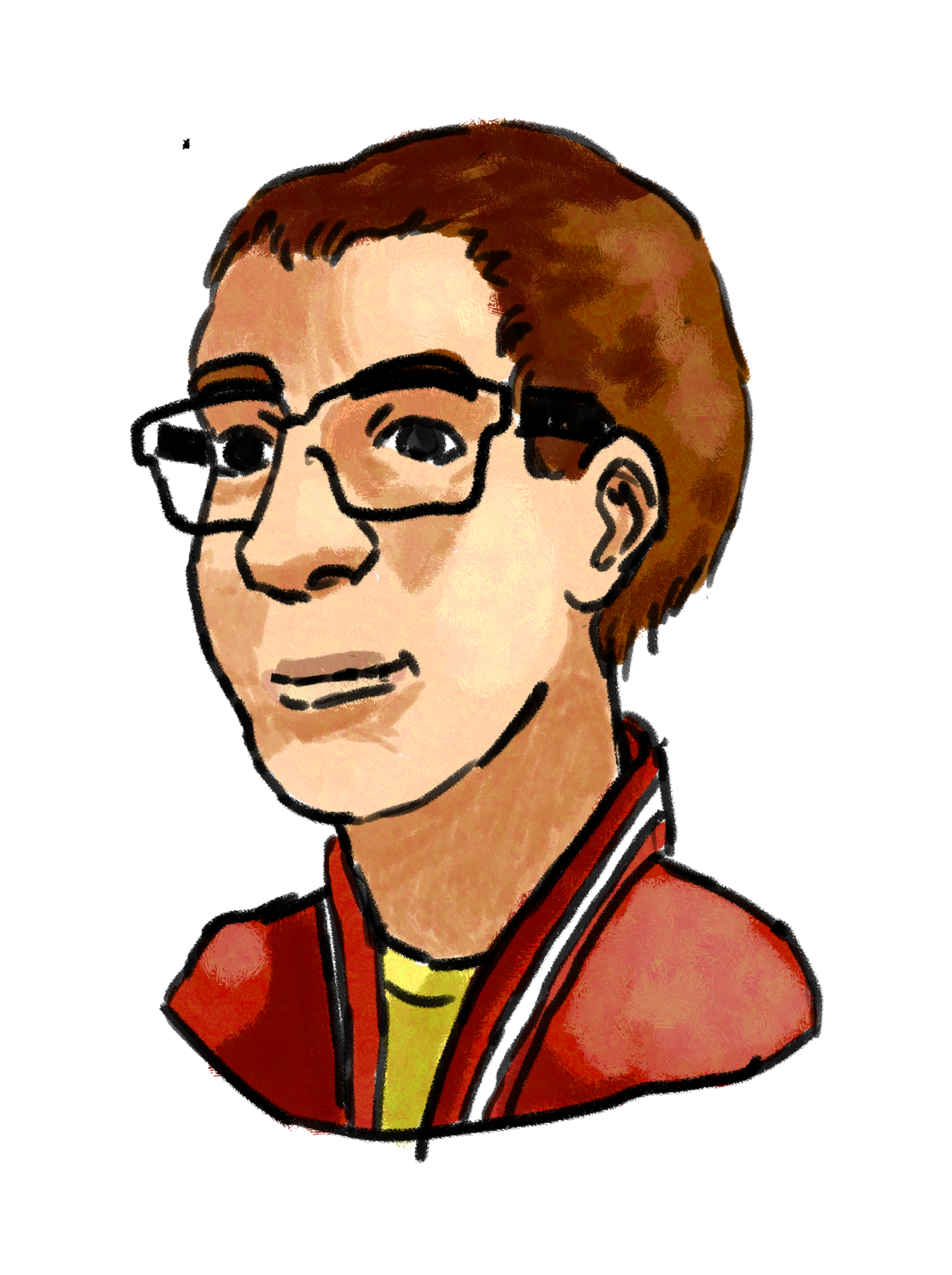 |
|
We have been learning the conversational past tense. Using Hannah as an example, let’s review how she says what rooms her place has now and what rooms her place had before.
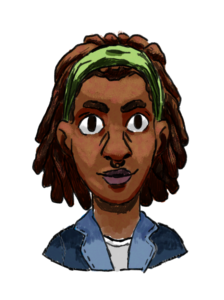 Hannah sagt:
Hannah sagt:
Ich wohne in Tübingen in der Eugenstraße 18. Das ist eine Wohnung in einem Haus. Die Wohnung hat vier Schlafzimmer, ein Wohnzimmer, eine Küche und zwei Bäder.
Vorher habe ich bei meiner Familie in Schwabenheim gewohnt. Unser Haus hatte drei Schlafzimmer, ein Wohnzimmer, eine Küche und ein Badezimmer.
Jetzt bist du dran!
Welche Zimmer hast du in deiner Wohnung? Write your answer in your journal. You can either use the construction, Ich habe [and then list the rooms] or Meine Wohnung hat…
Now let’s talk about your last place of residence by answering the question: Welche Zimmer hatte deine Wohnung/dein Haus vorher?
In your audio journal, practice saying your sentences aloud.
2) Die Zimmerausstattung
What types of features do your rooms have? Let’s build your vocabulary with these flash cards and exercises, then move through each room to learn more specific amenities.
Key Takeaways
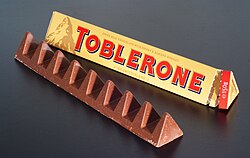
Toblerone wurde 1908 in Bern erfunden. Die dreieckige Form ist von den Schweizer Alpen, besonders dem Matterhorn, inspiriert. Im Logo kann man auch einen Bären sehen, das Symbol der Stadt Bern.
Toblerone was created in 1908 in Bern. Its triangular shape is inspired by the Swiss Alps, especially the Matterhorn. In the logo, you can also see a bear, the symbol of the city of Bern.
Kleiner Hinweis
| For those who live in buildings with multiple floors (floor = Stock oder Etage), it’s important to note that in German, the floors are counted differently than they are in the United States.
You can see and hear the difference in this short video from DKH Institut. |
US first floor
US second floor US third floor |
das Erdgeschoss
die erste Etage/der erste Stock die zweite Etage/der zweite Stock |
das Schlafzimmer
Was ist dein Lieblingszimmer? Das Schlafzimmer vielleicht? Listen and read the most important elements of a bedroom[1]. Some additional vocabulary can be found in the Hinweis box below.
Kleiner Hinweis
Remember that German is famous for its compound words (Komposita). Look at the way the words for different types of Tische (tables) und Bette (beds) are formed. Can you guess what some of these words might mean?
| der Nachttisch
der Schreibtisch der Schminktisch |
nightstand
desk vanity |
das Einzelbett
das Doppelbett das Etagenbett |
single bed
double bed bunkbed |
das Badezimmer
What parts of the bathroom do you already know? Vielleicht die Toilette oder die Dusche? Look at the picture and match what you know.
die Küche
Kleiner Hinweis
If the kitchen is important to you, you might want to know these words, too.
| der Geschirrschrank
die Besteckschublade der Tiefkühlschrank |
dish cupboard
silverware drawer freezer |
der Wasserhahn
der Esstisch die Abzugshaube |
faucet
dining table exhaust hood |
das Wohnzimmer
Look around your living room. Do you have the following items? Be sure to click through to each slide[3].
Was hast du sonst noch? Vielleicht einen Fernseher, eine Spielkonsole, oder einen Schreibtisch? (TV, gaming console, desk)
die Terrasse/der Balkon
Many Germans love their balcony or terrace because they can have small gardens. Siehst du im Bild Gartenstühle oder einen Gartentisch?
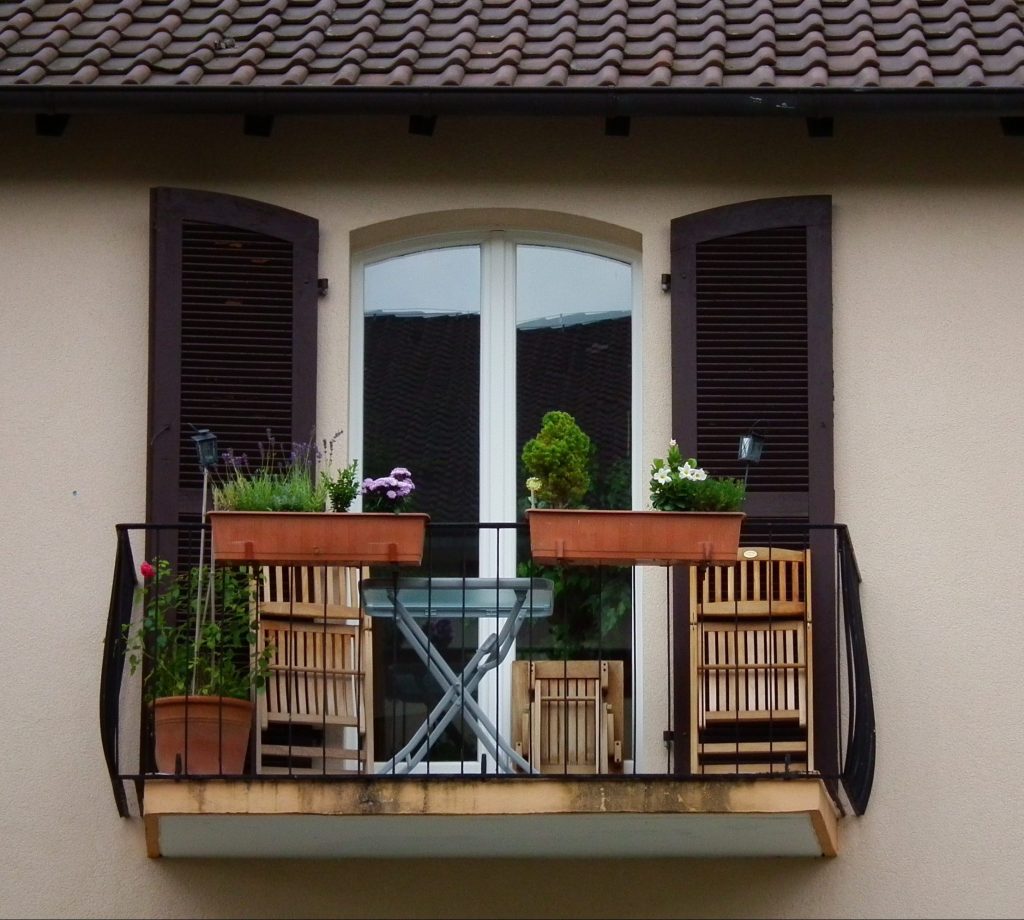 |
|
der Wäschekeller/die Waschküche
| The laundry room is quite simple. In dem Wäschekeller gibt es die Waschmaschine und den Trockner.
Let’s practice! |
|
Do you remember where everything goes? Test your knowledge!
3) Meine Wohnung
What do you have in your living space? Read and listen to the comics below.
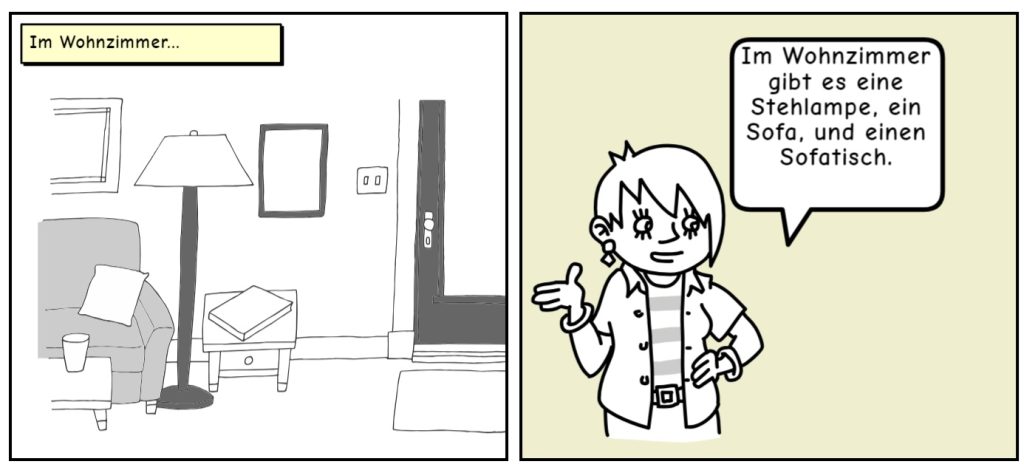 |
|
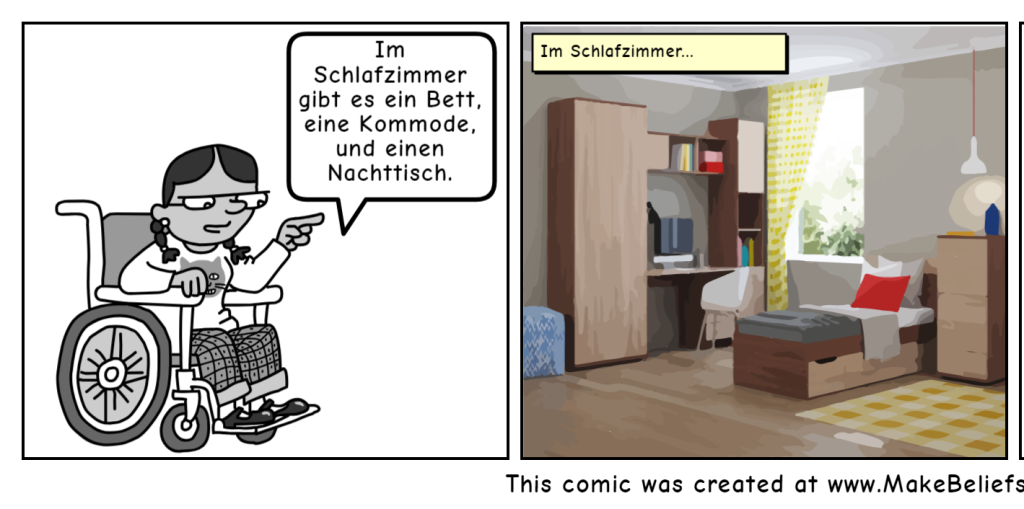 |
Now let’s practice building sentences.
Watch the following interview about a Lieblingszimmer and answer the questions below.
Deutsche Welle has a great series called Nicos Weg. You can watch the following episodes to get a feel for living arrangements, furniture, and life in Germany.
| Video 1: So wohne ich
Video 2: Meine Wohnung |
Video 3: Sofa, Sessel und Tisch
Video 4: Unser Haus |
Jetzt bist du dran!
Was ist dein Lieblingszimmer? In your written journal, write about your favorite room. Which pieces of furniture, appliances, and other items are in your favorite room? Then practice saying your sentence(s) aloud. When you are ready, record it in your audio journal. Feeling motivated? Choose a second room and repeat the exercise.
Jetzt kombinieren!
In the previous lesson, you learned to describe the type of building you live in. In this lesson, you learned to 1) talk about the typical rooms in a house or apartment, 2) talk about the typical features and furniture, and 3) describe your living space.
Let’s combine the information from both lessons, like this:
- Ich wohne in einer Wohnung in einem Hochhaus.
- Ich habe eine Essküche, ein Wohnzimmer, drei Schlafzimmer, und ein Badezimmer. Ich habe eine kleine Terrasse. Ich habe keinen Wäschekeller.
- Im Schlafzimmer gibt es….Im Wohnzimmer gibt es…und so weiter (and so on…)
Wo wohnst du? Welche Zimmer hast du? Was für Möbel und Zimmerausstattung hast du? Answer these questions modeled after the examples above.
Then record yourself in your audio journal. Be sure to listen to your recording and rerecord, if you are not satisfied.

Media Attributions
- Private: 2030-2040 ch banner reduced size
- Image of Hannah from Grenzenlos Deutsch is licensed under a Creative Commons Attribution-NonCommercial-ShareAlike 4.0 International License
- Photo of Toblerone by Ashley Pomeroy, Wikipedia, CC BY 3.0
- Photo of Balkon by 4028mdk09, CC BY-SA 3.0, via Wikimedia Commons
- Im Wohnzimmer comic made at wwww.MakeBeliefsComix.com
- Im Schlafzimmer comic made at www.MakeBeliefsComix.com
- Schlafzimmer slideshow from Willkommen: Deutsch für alle Copyright © 2020 by Claudia Kost and Crystal Sawatzky, licensed under a Creative Commons Attribution-NonCommercial-ShareAlike 4.0 International License, ↵
- Essküche activity by Willkommen: Deutsch für alle Copyright © 2020 by Claudia Kost and Crystal Sawatzky, licensed under a Creative Commons Attribution-NonCommercial-ShareAlike 4.0 International License ↵
- Wohnzimmer presentation by Willkommen: Deutsch für alle Copyright © 2020 by Claudia Kost and Crystal Sawatzky, licensed under a Creative Commons Attribution-NonCommercial-ShareAlike 4.0 International License ↵

